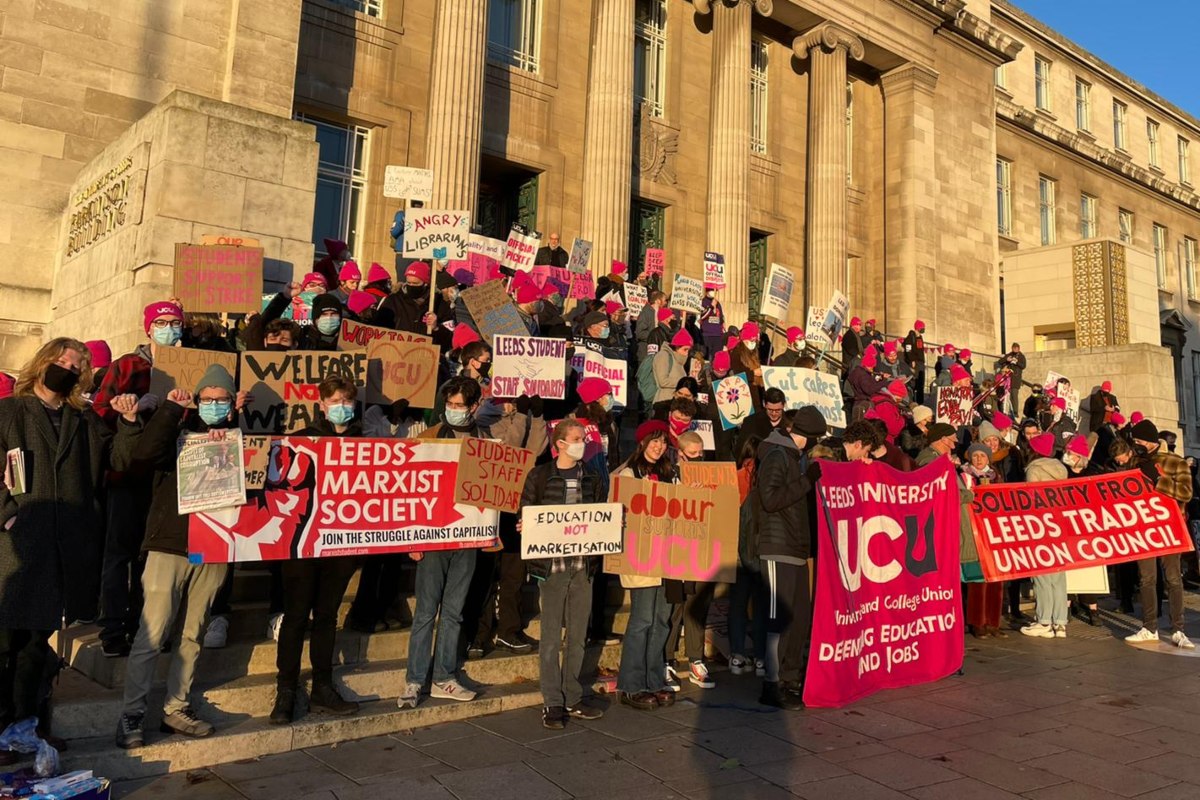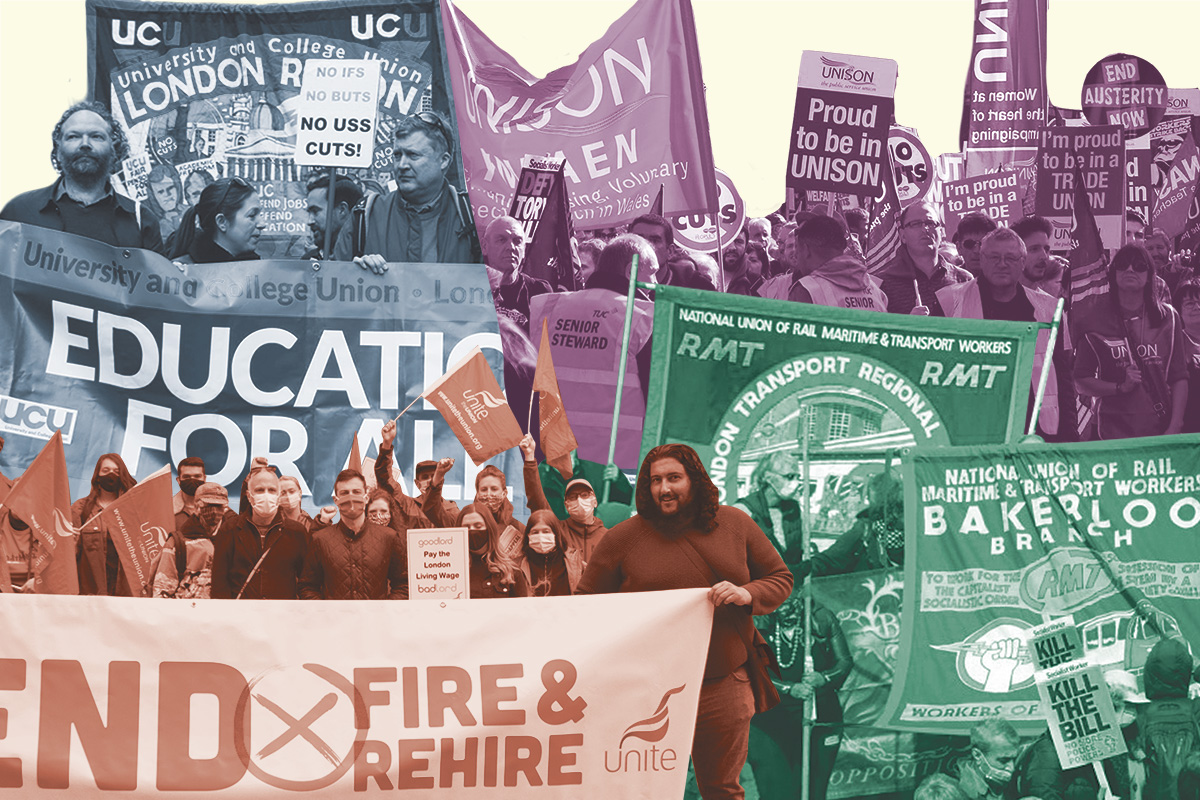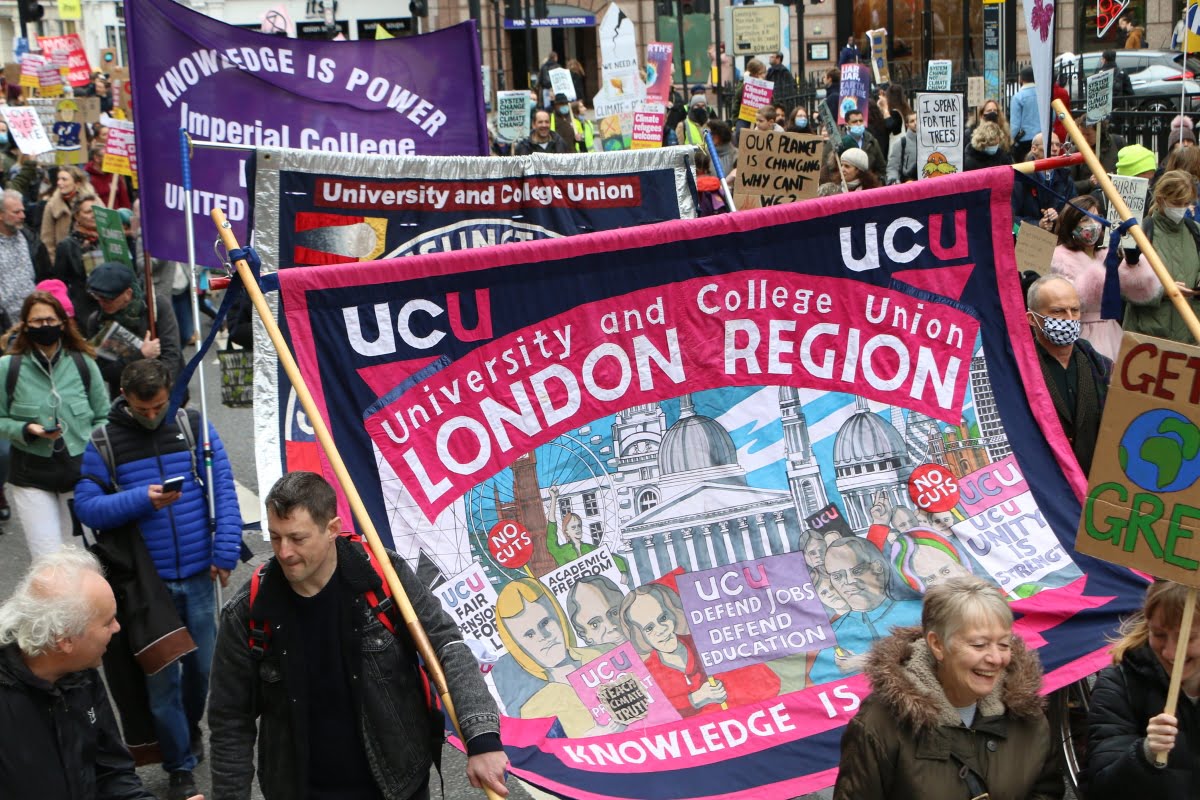Following defeat in last academic year’s university strikes, UCU members are again balloting for action. This time, if the vote is successful, branches will all come out together, paving the way for coordinated action – on campuses and beyond.
You could forgive employers for breathing a sigh of relief. The Queen’s death seemed as if it would bring a hot summer of strike action to a pause, with union leaders declaring a one-sided truce during the official mourning period.
But this relative peace could only ever be temporary. None of the issues that have provoked the recent strike wave have been resolved.
Change in mood
Just two days before the Queen passed away, the Universities and Colleges Union (UCU) formally launched its new campaign, ‘UCU Rising’: a massive get-out-the-vote drive for a ballot of members in higher education (HE), which opened on 7 September.
The energy around this campaign is distinctively radical. UCU is threatening to bring the entire UK university sector to a standstill, with an “unprecedented” 150 HE institutions potentially in line to see strike action.
Excited to receive UCU ballot today and @ucu can count on a resounding YES vote from me. I beg other members @UoNUCU to do the same. Lord knows we desperately need a change in academia. The system is not working. #ucuRISING pic.twitter.com/R9cg97M0BN
— Charles Ogunbode (@charlesogunbode) September 7, 2022
Such a development would not have seemed likely only a few months ago.
At the end of the last academic year, the most recent wave of UCU strike action went down to defeat in the face of determined resistance from the bosses, combined with half-hearted and indecisive leadership from the union tops.
Failure to prevent cuts to the pensions scheme, or to force university management to agree to any of the demands included in the ‘Four Fights’ (over pay, casualisation, workloads, and inequality), left many members demoralised.
But this mood now appears to be turning around, thanks to the inspiring example set by striking workers in other unions.
The militancy of unions like the RMT, who have repeatedly brought the rail network to a halt, alongside successes in local strikes, where higher-than-inflation pay rises have been won, has demonstrated to members what is possible on the basis of determined action.
And determined action is precisely what will be needed. As the cost-of-living crisis continues to bite, the watchwords on the lips of rank-and-file union members are “we cannot afford not to strike”.
Insulting offer
University management have offered a disgraceful 3% pay rise – in reality, a massive pay cut, given that headline inflation is hovering around 10%, and is set to rise even higher.
This comes on the back of more than a decade of austerity for UK universities, despite soaring tuition fees, which – even before the current spike in inflation – left academic workers more than 20% worse off in real terms than before the 2008 crash.
It goes without saying, of course, that the fat cats at the top continue to reward themselves handsomely, with six figure salaries. If you didn’t know any better, you’d think they must have been doing a stellar job of managing the country’s universities!
This explains the renewed radicalism amongst UCU members, which is forcing the national leadership to come out more boldly, after their rather reluctant performance in last year’s strike.
Lessons to learn

It is encouraging to see that some lessons from the last strike have been learnt. The ballot, this time, is being conducted on an aggregated basis. This means that if the UCU nationally exceeds the anti-union legal threshold of a 50% turnout, with a majority voting Yes to action, then the entire membership in higher education can be called out on strike.
This is clearly a step forward from the disaggregated ballots of previous rounds, which left striking universities feeling isolated, and which provided grist for the bosses’ propaganda mills, with the number of universities on strike dwindling following a reballot.
The ballot period is also being extended to almost two months, allowing members more time to campaign and increase the turnout.
These are excellent first steps, and will surely galvanise members. With Unison members on campuses also striking, the time has never been better for us to mobilise.
The task now, however, is also to tackle the big strategic question: How should UCU members conduct this struggle, if and when they do obtain a mandate to strike?
Here, the lessons from last year’s strikes will again come in useful.
The bosses were able to wear UCU members out on the basis of a strategy of limited strike action, with the union announcing exactly when staff would be returning to work. This allowed the bosses to simply wait out each round of strikes.
This time, our programme must be one of indefinite strike action. This should be prepared for in advance, so that it can be called as soon as the results are in. The bosses have to know that we are not going back to work until our demands are met.
Unite and fight

This strategy – the only serious strategy in the face of a ruling class determined to make workers pay for their crisis – must not only be put to existing union members, but should also be the basis for a massive recruitment campaign.
Under the hammerblow of events, many previously non-unionised academics will now be open to the need for radical action. If the union provides a bold lead, they will join our ranks in droves. This is how we can truly shut down the universities.
Finally, the UCU must appeal to other workers to join this struggle. Members of Unite and Unison on campuses face exactly the same problems as lecturers and researchers.
It is time for all university workers to come out on strike together, and to show the bosses who really runs our workplaces.
This, in turn, should be part of coordinated strike action across the trade union movement nationally, especially across the public sector.
All these unions should link up and prepare for a one-day public sector strike, as the starting point for a mass campaign to kick out Truss’ Tories, who have missed no opportunity to remind us whose side they are on: that of the bosses and bankers.
Armed with a thoroughgoing socialist programme, such a campaign could inspire millions.
These are not ordinary times. Rather, we are in an epoch of deep crisis, which calls for audacity and extraordinary measures.
Only in this way can we harness the radicalism and militancy that workers are rediscovering, in order to win decent living conditions for all workers.






